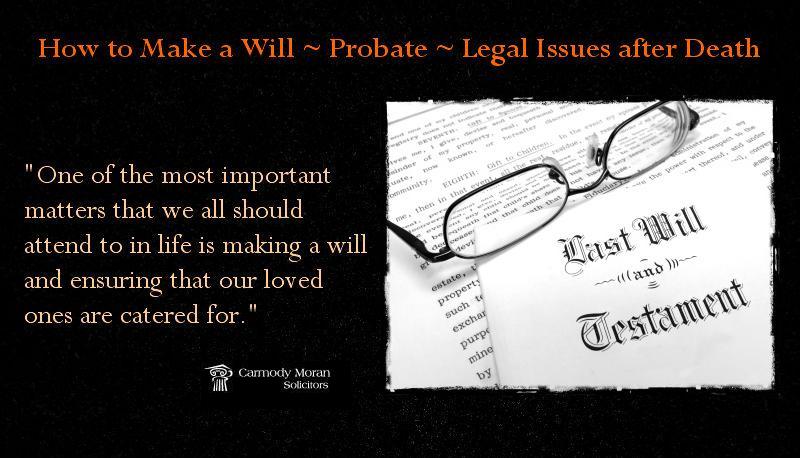Here are some frequently asked questions about making a will and legal matters after death.

Why should I make a Will?
Making a well thought out considered Will secures the future of your family and loved ones.
Everyone’s personal circumstances are different. Your circumstances may be simple and you may wish to provide for your spouse and children equally.
Alternatively you may wish to provide for some of your family only or you may have an incapacitated or disabled child to consider or a family business to deal with for example. You may have specific wishes you wish to achieve for example you may wish to provide for your husband or wife but to protect the inheritance of children from a former relationship at the same time.
Similarly your Will should be reviewed at regular intervals for tax changes and also in accordance with your personal circumstances such as changes in your marital status or in your close relatives. We would also advise people when stepping onto the property ladder that now is a good time to make or review their Will. It is never too early to make a Will.
If you have not made a Will, then the process of administering your Estate and affairs becomes more cumbersome and expensive and an administration bond has to be extracted before papers can progress to probate.
Taking the time to make a Will and discuss your options and your obligations as well the restrictions the law may impose on your personal situation is invaluable in planning for your family and loved one’s future. The best policy is always to get expert advice that you can rely upon and trust when making these important decisions.
Who should I appoint as an Executor in my Will? How do I choose an Executor?
This is a big decision. You should choose the person best suited to carrying into effect the terms of your Will. One of the many advantages to making this Will is that you get to choose and identify this person.
Generally the appointment of two persons as Executors is recommended and if you are a senior citizen it is advisable that at least one of the persons you choose is younger than you.
It can be a family member, trusted friend, or relative or it can be a professional such as your solicitor or accountant or both.
Can a solicitor or another professional act as Executor?
Yes. Sometimes appointing a professional such as a solicitor and / or an accountant can make sense if your Estate is likely to involve complex issues or if there are special circumstances. These complex issues can arise for example:
- from the nature of the assets in your Estate
- taxes or business issues
- a beneficiary suffering under a disability
Sometimes it can simply be the case that you would prefer to appoint an outsider rather than prefer one family member over another to act as an impartial Executor.
What happens if the Executor named in the Will has died?
Effect can still be given to your Will with the obvious exception of the appointment of the Executor who is no longer alive. This type of situation gives rise to an impartial intestacy and a Grant of Administration with Will Annexed is extracted.
How long does Probate in Ireland take?
This varies from case to case depending on the nature of the Estate, any delays in processing the Probate application and any challenges or disputes that might arise. Traditionally the time for an Executor to act was referred to as “an Executor’s year” and this is what most prudent Executors and their advisors aim to achieve.
What if I am separated or divorced?
Being separated does not mean that your former husband or wife automatically lost the entitlement to claim a legal right share of your Estate. These situations can be addressed in a Will and the rights can be dealt with in Court Orders for judicial separation or divorce and in Separation Agreements. These provisions can also apply to civil parents under the 2010 Act.
These are however complex issues and strict deadlines can apply to make a claim for proper provision as a former or separated husband or wife and both Executors and claimants should take early legal advice in such situations.
If you are separated or divorced you should up date your Will on your change of marital status. You should bring with you a copy of all Court Orders and / or Deed of Separation when meeting with your Solicitor to make your Will. It is essential that your Will is prepared on the basis of your own personal circumstances.
What if I am an unmarried partner?
Where partners are not married but living together (cohabiting) there are no automatic succession rights and as such a properly drafted Will is very important.
A surviving cohabitant now has the right under the 2010 Act to apply to Court for provision from the Estate of a deceased co-habitant. Previously partner’s were limited to whatever rights they could establish in Contract.
There’s no Will, what do I do? What happens if I die without making a Will? Why should I make a Will?
When a person dies without having made a Will they are said to have died intestate.
In these circumstances rather than being able to apply for a Grant of Probate an application must be made for a Grant of Letters of Administration. This issues to the person(s) who were the nearest next of kin as of the date of death in accordance with the rules as set out in the Succession Act 1965.
The rules as set out in Succession Act 1965 also determine the shares by which parties inherit and these provisions vary according to the individual’s surviving next of kin and whether or not there are children.
While often people are superstitious about making their Will it is crucial that your Will is geared around your own personal circumstances. The absence of a Will can often add to the stress and upset of a bereavement and making a Will is one of the ways in which you can protect and plan for your family and loved ones.
If you have not made a Will, then the process of administering your Estate and affairs becomes more cumbersome and expensive and an administration bond has to be extracted before papers can progress to probate.

Your Will should be reviewed regularly to allow for changes in your personal circumstances as well as changes in the law and tax changes. Our solicitors will help you review your Will and write your Will.